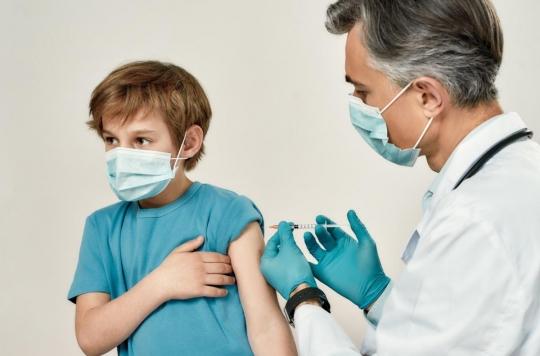In 2020, 23 million children were not vaccinated against diphtheria, tetanus and whooping cough.

- In France, vaccination against diphtheria, tetanus and pertussis is compulsory for infants.
- According to the UN, the closure of certain clinics, containment measures, the reduction of public transport and the fear of being contaminated have contributed to the drop in childhood vaccination.
- The UN, WHO and UNICEF aim to achieve 90% vaccination coverage by 2030, for essential childhood vaccines.
The pandemic is slowing everything down, and children are suffering. The United Nations are issuing an alert on Thursday July 15: a significant delay has accumulated in the vaccination of children, posing the risk of a “absolute disastere”.
In 2020, 23 million children did not receive the necessary three doses of the vaccine against diphtheria, tetanus and pertussis. This is the highest figure since 2009, and represents 3.7 million more unvaccinated children compared to 2019.
A risky situation
According to information collected by the United Nations, nearly 17 million children have not received any vaccine dose since the beginning of 2020. Dr Tedros Adhanom Ghebreyesus, Director General of WHO, is concerned about this backtracking on the vaccination. “Multiple outbreaks would be catastrophic for communities and health systems already overwhelmed by Covid-19, he announces in a communicated. In view of this, it is even more urgent to invest in childhood vaccination, and to ensure that every child benefits from it.“In addition to those children who did not receive these life-saving vaccines, millions more did not receive the necessary doses of other childhood vaccines.
India, the country most affected by childhood vaccination delays
“Most of these children live in communities affected by conflict, in remote places without access to services, or in slums, where they face many challenges including limited access to health and social services.“, underlines the WHO in its press release. The regions most affected are South Asia and the eastern Mediterranean regions. In India, more than 3 million children have not received the vaccine against diphtheria. , tetanus and whooping cough, compared to 1.4 million in 2019. In Pakistan, 968,000 children did not receive it, and 797,000 in Indonesia.
The return of certain diseases
“Before the pandemic, there were worrying signs that already showed that we were losing ground in vaccinating children against preventable childhood diseases, especially with the measles epidemics two years ago., recalls Henrietta Fore, Executive Director of UNICEF. Ihe pandemic has worsened the situation.” For example, in 2019, the United States was faced with the return of measles, whereas it had been declared eradicated in 2000 in the country. For several years, vaccination against diphtheria, tetanus, whooping cough , measles and polio stagnated at around 86%, below the 95% recommended by the WHO.
Due to the #COVID19 pandemic, 2⃣3⃣ million children ???????? missed out on basic vaccines through routine immunization services in 2020, increasing by 3.7 million and the highest number since 2009.
More data from WHO & @UNICEF ????https://t.co/bt6n7OAQrq pic.twitter.com/lHnnrbYvPn
— World Health Organization (WHO) (@WHO) July 15, 2021
.















